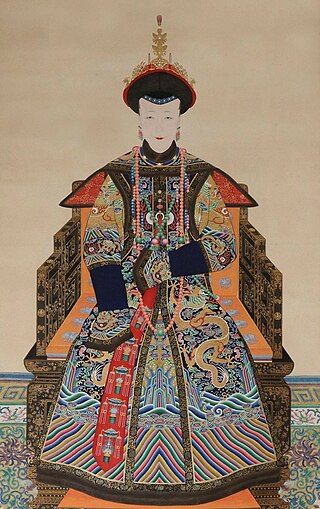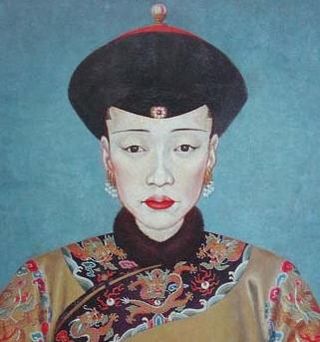| |||||
| Decades: | |||||
|---|---|---|---|---|---|
| See also: | Other events of 1820 History of China • Timeline • Years | ||||
Events from the year 1820 in China .
| |||||
| Decades: | |||||
|---|---|---|---|---|---|
| See also: | Other events of 1820 History of China • Timeline • Years | ||||
Events from the year 1820 in China .

The Daoguang Emperor, also known by his temple name Emperor Xuanzong of Qing, personal name Mianning, was the seventh emperor of the Qing dynasty, and the sixth Qing emperor to rule over China proper. His reign was marked by "external disaster and internal rebellion". These include the First Opium War and the beginning of the Taiping Rebellion which nearly brought down the dynasty. The historian Jonathan Spence characterizes the Daoguang Emperor as a "well meaning but ineffective man" who promoted officials who "presented a purist view even if they had nothing to say about the domestic and foreign problems surrounding the dynasty".

The Jiaqing Emperor, also known by his temple name Emperor Renzong of Qing, personal name Yongyan, was the sixth emperor of the Qing dynasty and the fifth Qing emperor to rule over China proper. He was the 15th son of the Qianlong Emperor. During his reign, he prosecuted Heshen, the corrupt favorite of his father and attempted to restore order within the empire while curbing the smuggling of opium into China. Assessments of his reign are mixed, either seen as the "beginning of the end" of the Qing dynasty, or as a period of moderate reform that presaged the intellectual movements of the 1860s.
Gūwalgiya was one of the most powerful Manchu clans. It is often listed by historians as the first of the eight prominent Manchu clans of the Qing dynasty. After the demise of the dynasty, some of its descendants sinicized their clan name to the Han Chinese surname Guan (關).

Heshen (Manchu: ᡥᡝᡧᡝᠨ, Möllendorff: Hešen; Chinese: 和珅; pinyin: Héshēn; Wade–Giles: Ho2-shen1; 1 July 1750 – 22 February 1799) of the Manchu Niohuru clan, was an official of the Qing dynasty favored by the Qianlong Emperor and called the most corrupt official in Chinese history. After the death of Qianlong, the Jiaqing Emperor confiscated Heshen's wealth and forced him to commit suicide. As an official, he acquired an estimated at 1.1 billion taels of silver, equal to roughly US$270 billion. Heshen is remembered as one of the richest men in history.

Chengde Mountain Resort is a large complex of imperial palaces and gardens situated in the Shuangqiao District of Chengde in northeastern Hebei province, northern China, about 225 kilometres (140 mi) northeast of China's capital Beijing. This resort was frequently used as a summer palace during the Qing dynasty. Because of its vast and rich collection of Chinese landscapes and architecture, Chengde Mountain Resort in many ways is a culmination of all the variety of gardens, pagodas, temples and palaces from various regions of China. In 1994, The Mountain Resort was awarded World Heritage Site status.

Imperial Noble Consort Gongshun (恭順皇貴妃) of the Manchu Bordered Yellow Banner Niohuru clan (鈕祜祿氏) was a consort of the Jiaqing Emperor. She was 27 years his junior.

Empress Xiaoherui, of the Manchu Bordered Yellow Banner Niohuru clan, was a posthumous name bestowed to the wife and second empress consort of Yongyan, the Jiaqing Emperor. She was empress consort of Qing from 1801 until her husband's death in 1820, after which she was honoured as Empress Dowager Gongci during the reign of her step-son, Mianning, the Daoguang Emperor. She was the longest-serving empress consort in Qing history.

Empress Xiaoshurui (孝淑睿皇后), of the Manchu Plain White Banner Hitara clan (喜塔臘氏) was a posthumous name bestowed to the wife and first empress consort of Yongyan, the Jiaqing Emperor. She was empress consort of Qing from 1796 until her death in 1797, having been empress for barely a year.

Empress Xiaoyichun, of the Manchu Bordered Yellow Banner Weigiya clan, was a consort of the Qianlong Emperor. Her eldest surviving son became the Jiaqing Emperor.

Empress Xiaoshencheng, of the Manchu Bordered Yellow Banner Tunggiya clan, was a posthumous name bestowed on the wife and first empress consort of Mianning, the Daoguang Emperor. She was empress consort of Qing from 1822 until her death in 1833.

Imperial Noble Consort Qinggong, of the Han Chinese Bordered Yellow Banner Lu clan, was a consort of the Qianlong Emperor. She was 13 years his junior. She came from the Lu clan. Although her family was not a very prominent one, Lady Lu rose to Noble Consort in her lifetime. Imperial Noble Consort Qinggong had no children of her own, but raised Prince Yongyan, the future Jiaqing Emperor.

Noble Consort Ying, of the Mongol Bordered Red Banner Barin clan, was a consort of the Qianlong Emperor. She was 20 years his junior.

Noble Consort Xun, of the Manchu Bordered Blue Banner Irgen Gioro clan, was a consort of the Qianlong Emperor. She was 47 years his junior.

Noble Consort Wan, of the Han Chinese Chen clan, was a consort of the Qianlong Emperor. She was five years his junior.

The Jinan Great Southern Mosque is the oldest mosque in the city of Jinan, Shandong Province, China. It was established during the Yuan dynasty. Most of the present structures were erected during the Ming dynasty. The basic layout of the mosque is that of a Chinese temple into which the elements needed for its function as a mosque have been integrated.

The imperial hunt of the Qing dynasty was an annual rite of the emperors of China's Qing dynasty. It was first organized in 1681 by the Kangxi Emperor at the imperial hunting grounds at Mulan. Starting in 1683 the event was held annually at Mulan during the autumn, lasting up to a month. The Qing dynasty hunt was a synthesis of earlier Han and Inner Asian hunting traditions, particularly those of the Manchus and Mongols. The emperor himself participated in the hunt, along with thousands of soldiers, imperial family members, and government officials.
Xin Baiqing is a Chinese actor best known for portraying Li Bai in Legend of the Demon Cat (2017) and Guan Xiaohe in Four Generations under One Roof (2010), which garnered him a Best Performance Award at the 2012 Golden Lion Award.

The Haidian Mosque is a mosque in Haidian District, Beijing, China.
Imperial Noble Consort Heyu, of the Han Chinese Bordered White Banner Liu clan, was a consort of Jiaqing Emperor.
Consort Hua, of the Han Chinese Hougiya clan belonging to the Bordered Yellow Banner, was a consort of Jiaqing Emperor.